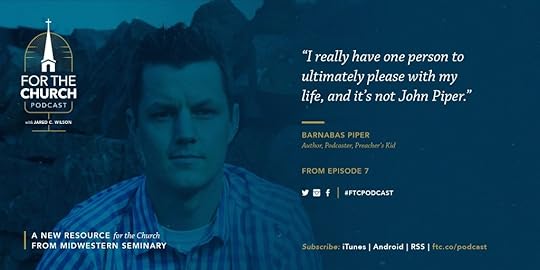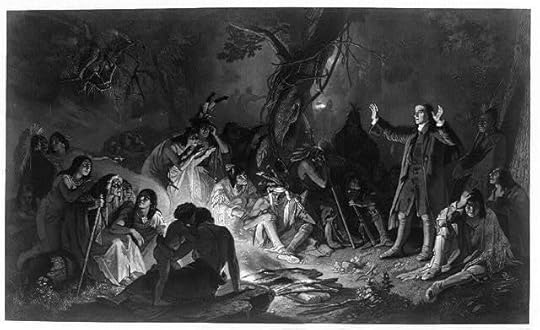Jared C. Wilson's Blog, page 18
June 28, 2017
Why Discipleship Matters
At the 2017 Southern Baptist Convention, I was honored to share the stage with a few other men at Midwestern Seminary‘s annual For The Church micro-conference. We each got 8 minutes to speak to a specific issue related to the church and to church ministry. I took 10, I’m sorry to say — not really — as I addressed “Why Discipleship Matters.”
Drawing from Jesus’ words in the Great Commission (Matthew 28:19), I proposed this outline:
1. Discipleship matters because fidelity to Christ matters.
2. Discipleship matters because the integrity of the church matters.
3. Discipleship matters because the expansion of God’s glory matters.
I spoke (briefly, of course) to issues like dwindling baptism and membership numbers, the apparently decline of evangelism in the church, and that recurring social media habit of some pastors to post their weekly “catch,” and I tried to suggest some root causes — and solutions. I pray it challenges and blesses you.
Jared Wilson – Why Discipleship Matters from Midwestern Seminary on Vimeo.
Excerpts:
- Jesus said to "make disciples." If we are only aiming at getting people to pray the sinner's prayer, we are only partially obeying Jesus. And partially obeying Jesus is disobeying Jesus.– Let's remember that Christ has called us not simply to make converts but to "make disciples."
– We've got moral relativism in our personal spirituality, therapeutic religion in our theology, consumeristic pragmatism in our ministry.
– The reason large swaths of evangelicals today have no problem setting biblical teaching aside to affirm the idolatries of our culture, setting orthodoxy aside to flirt with repackaged modern heresies is because they've perhaps been led in a prayer but they haven't been led to deny themselves, take up their cross, and follow Jesus.
– God's vision for the world is not primarily the bigness of the church but the bigness of his own manifest presence in every nook and cranny of the world.
– Let's consider the theory that one reason we aren't reaching as many people with the gospel is because we've relocated the primary evangelistic event to the Sunday morning service, basically saying evangelism is the job of a few experts.
– Maybe we'd baptize more on Sunday if we better discipled our people to share the gospel Monday through Saturday.
– Maybe our failure to disciple the converts we make is why we're making fewer converts.
Watch the other FTC micro-conference talks, including addresses from Mark Dever, Jason Allen, Al Mohler, Thom Rainer, Owen Strachan, and SBC President Steve Gaines.
June 27, 2017
The Apostate’s Creed
The Apostate’s Creed
I often believe in god, the life-force friendly
observer of heaven and earth.
I believe in a Jesus Christ, our good example
who might have been conceived by the Holy Spirit, if you go for that sort of thing,
born of the Virgin Mary,
victimized by the government,
was crucified, died, and buried;
he descended to the dead.
On the third day he rose again, maybe just spiritually in the hearts of his followers, we’re not sure;
he ascended into heaven,
he is seated at the right hand of the Father,
and he will come, but not to judge anybody, because judging is bad.
I believe in sending good thoughts,
the holy catholic pluralism,
the communion of mankind,
the redefinition of sins,
the supremacy of the body,
and that somehow everybody makes it (except Hitler and Donald Trump).
Amen.
June 23, 2017
20 Quotes from *The Imperfect Disciple*
The Imperfect Disciple debuted a month ago, and I’ve been keeping an eye on what lines seem to resonate the most with readers, at least according to what I’ve been able to seen on social media. Below are 20 quotables from the book that seem to have landed well with others. Maybe they will with you too.
1. “The point of the Christian life is not self-improvement or more Bible knowledge but Christlikeness.”
2. “The words of fear and shame may cut deep, but Christ’s blood speaks a better word.”
3. “Jesus is looking specifically for the people who can’t get their act together.”
4. “A message of grace will attract people but a culture of grace will keep them.”
5. “One of the subtle dangers of the way many Christians ‘do discipleship’ is that they are always somehow looking at Jesus and yet never really seeing him.”
6. “Our obedience is not the grounds of our relationship (with Jesus) but the overflow of it.”
7. “Every day, I wake up into Romans 7. Every dadgum day. My alarm goes off and I sit up in bed, my uncoffeed consciousness groggily gearing up for sins-both of omission and of commission. I'm engaged in the flesh before I even get my feet on the carpet. And yet, right there beside me, laid out like the day's outfit for school, are new mercies. Romans 8 lies right there, spooning Romans 7 in a full-size bed, no wiggle room.”
8. “What is the use of telling a guy in bare feet to pull himself up by his bootstraps?”
9. “No matter how you feel, if you are a follower of Jesus, you are never truly stuck.”
10. “What is discipleship, then, but following Jesus not on some religious quest to become bigger, better, or faster, but to become more trusting of his mercy toward our total inability to become those things?”
11. “It’s interesting how often the areas of our inner selves we strive the most to hide from Jesus are the ones he’s most interested in. And it’s amazing that these things about ourselves we hope he doesn’t see are the very things he means to cover with his grace.”
12. “Only the gospel gives us the security (of union with Christ) to risk reputation and hurt in order to love others sacrificially and boldly.”
13. “When our vision is constantly occupied by small things, we are tempted to yawn more at the glory of God.”
14. “The problem is the same every day, but the mercies are new.”
15. “This is the whole point of reading and studying the Bible – to encounter the glory of Jesus – and if we aren’t reading and studying to encounter the glory of Jesus, we are missing the whole point.”
16. “In the end, as in the beginning, it is not our good intentions or even our good deeds that will get us out of the muck of ourselves. It is God’s rescuing hand. It is his enduring announcement over us messed-up creatures, ‘I love you,’ that changes everything.”
17. “I wonder sometimes how all of our steps, tips, and quasi-spiritual ‘life hacks’ come across to the Christian woman who is married to an unbelieving husband completely apathetic to the things of God, to the young Christian whose parents aren’t saved and hate that he is, to the husband whose wife seems more interested in Pinterest than in him, to the working-class guys and gals who see through the slick pick-me-ups of the privileged, to the frequently discouraged, the constantly disappointed, and the perennially depressed.”
18. “Do you know why there are a thousand fresh self-help books every year? It’s because they don’t work.”
19. “Jesus’ major contribution to the world was not a set of aphorisms (general truths). He was born in a turdy barn, grew up in a dirty world, got baptized in a muddy river. He put his hands on the oozing wounds of lepers, he let whores brush his hair and soldiers pull it out. He went to dinner with dirtbags, both religious and irreligious. His closest friends were a collection of crude fishermen and cultural traitors. He felt the spit of Pharisees on his face and the metal hooks of the jailer's whip in the flesh of his back. He got sweaty and dirty and bloody – and he took all of the sin and mess of the world onto himself, onto the cross to which he was nailed naked.
In his work and in his words, Jesus is making promises to the beaten, the torn, the broken, the depressed, the desperate, the poor, the orphan, the abandonded, the cheated, the betrayed, the accused, the left-behind. He is, believe it or not, promising to fix it all.”
20.
We just don't get the Sermon on the Mount, or Jesus's ministry in general, like his immediate hearers did. Jesus wasn't turning things upside down. He was turning them right side up.This is why the good news is good news for those at the bottom. Think of every category of person spoken to in the Beatitudes:
The spiritually impoverished.
The emotionally devastated.
The psychologically weak.
The culturally oppressed.
The inwardly pure.
The relationally calm.
The physically abused.
The personally accused.Culturally speaking, do we cherish these people? Are these the kinds of people we typically feature on magazine covers or in awards shows? And we don't typically have a word for them. And yet these people are exactly the ones Jesus is speaking to. His words are especially designed for and specifically targeted at . . . well, losers.
And this cannot be good news for those who are, spiritually speaking, sitting at the head of the conference table. It cannot be good news for those who are, you know, feeling their own way through life by following the positive energy, man.
This cannot be good news for those clinking wine glasses over burnt steaks while making a deal on the vivisected corpses of babies. It cannot be good news for those trying to game the system.
But isn't it good news for those of us in the caves?
—
Also, Ann Voskamp was kind enough to share an excerpt this week to which we’ve seen a great response: Has God Asked You to Abandon Your Dream?
June 22, 2017
Why Should Preachers Actually Know the People They’re Preaching To?
A little something I shot for TGC: Why preaching pastors should know people in their congregation as much as possible.
Why Is It Important for Pastors to Personally Know the People in Their Congregation? from The Gospel Coalition on Vimeo.
June 21, 2017
Living in a Big Shadow
In the latest installment of the For The Church Podcast, I spoke with Barnabas Piper, Marketing Manager for B&H Academic, co-host of The Happy Rant and The 5 Leadership Questions podcasts, and author of books like The Curious Christian and The Pastor’s Kid. Topics of discussion include:
Why didn’t Barnabas get any endorsements on his new book?
The perils of platform building.
Why curiosity makes a pastor a better preacher.
What it’s like living and working in the shadow of his famous dad.
What not to say to pastors’ kids.
The early days of social media.
How cynicism helps.
Check out Episode 7 for this great conversation.
Previous episodes:
Owen Strachan on Rod Dreher’s The Benedict Option.
June 20, 2017
I Am the Center of the Universe
 This week I am having to drop my daughter off for a summer class in the morning. This has put me in the office 2 hours later than I usually arrive, and this morning as I was waiting for my coffee at Starbucks — rush, rush, rush — I could not believe how slow everyone was moving, as if they had no cares at all about my schedule. I find these same people in every line I fall into — grocery store checkouts, ATM’s, service desks.
This week I am having to drop my daughter off for a summer class in the morning. This has put me in the office 2 hours later than I usually arrive, and this morning as I was waiting for my coffee at Starbucks — rush, rush, rush — I could not believe how slow everyone was moving, as if they had no cares at all about my schedule. I find these same people in every line I fall into — grocery store checkouts, ATM’s, service desks.
I have also noticed that when I am trying to relax — rest, rest, rest — everybody else around me is frantic and bothering me. They ask me to do things. They make requests, interrupt my introversion, leave little piles of duty around my feet.
I can only come to one of two conclusions about my frustration over this inevitable fact of life: either I am the center of the universe and you all don’t know, or — I am not the center of the universe and I am upset that you all know.
I wake up this way. I bet you do too. We wake up in self-sovereignty mode. Then we get frustrated because we keep running into people who think they’re the center of the universe. It’s frustrating.
What a splendid mercy, even if a severe one, then, when Jesus gives us a hard shove out of our own makeshift thrones, and all the little planets we’ve set in orbit around us fall down — thump. thump. thump. thump. thump.
Where were you when I established the earth?
Tell me, if you have understanding.
— Job 38:4
June 9, 2017
I Hope I Die Before I Get Old
 Rose: “Don’t be worried, Mr. Allnut.
Rose: “Don’t be worried, Mr. Allnut.
Allnut: “Oh, I ain’t worried, miss. I gave myself up for dead back when we started.”
- from the film The African Queen
I previously pastored a church in the midst of a sizable population of the elderly. And while our church had begun attracting more and more young singles and young families and enjoying a bit of a baby boom, we were still smack-dab in an aging community in a state that sees most of its young adults exit its green pastures for ones socioeconomically greener. So I have had the heavy privilege of helping a few older folks pass to the other side. I’ve lost count of the funerals I’ve officiated.
Sometimes it is a great joy ministering to an old saint departing into glory. Sometimes it is a great heartbreak when the one mourned has given no indication of saving faith. Even more heartbreaking is sharing the gospel with folks basically on their deathbeds who see no need for Christ. I think of two men in particular in their final days. I sat at their bedsides praying for them, understanding they did not have long. I told them about Jesus and what he’d done and how trusting in him would mean so much gain, from the forgiveness of sins to the life everlasting.
You would think that even a spurious reception would be likely! You’d think if any time lent itself to a bet-hedging, what-could-it-hurt bit of life insurance for the soul, this would be it. Of course, I never “pitch” the gospel this way, as if one just needs to say a prayer or some magic words — as John Piper has said, “Christ isn’t won by the flip of a coin.” The gospel isn’t some good luck charm you can add to the hunches you call hopes. But I just used to figure if any situation would give way to even a “Well, what could it hurt?” Pascalian wager-taking, literally nearing certain death would do it.
But no. One fellow told me that I could pray for him but he wasn’t interested in doing anything religious himself. He’d never done it before; why do it now? The other fellow just sort of entertained my notions as the requisite “last rites” or some such things, but gave no response to the invitation to repent and believe in Jesus.
My mind goes to my friend Richard. He passed away four years ago. He was 32 years old. And by grace he was totally abandoned to Jesus. When you listen to his widow Erin talk about the turning point for them as far as dedicating their marriage to the glory of God concerns, she will say it was not when Richard was diagnosed. It was during a frustrating car ride home one day in a thunderstorm. Circumstances in their lives led them in that car ride to through tears and faith say to the Lord, “Whatever you want, whatever will magnify you, that’s what we want.” Richard had his seizure that led to his diagnosis a few days later.
What makes Richard different from these old coots who go out shaking their fist at the things of grace? Well, God. But also: Richard decided to die before he got old. He decided to die before he died. May we all do the same. Remember that Jesus said, “Whoever loses his life for my sake will find it” (Matthew 10:39).
Die before you die. There is no chance after.
– C.S. Lewis
Remember also your Creator in the days of your youth, before the evil days come and the years draw near of which you will say, “I have no pleasure in them.”
— Ecclesiastes 12:1
June 6, 2017
What’s Compelling About Christianity to Non-Believers?
A little something I shot for TGC, with a helpful (in my opinion) entry-point for evangelistic conversations.
What’s Compelling about Christianity to Non-Believers? from The Gospel Coalition on Vimeo.
Expanded thoughts in my book Unparalleled: How Christianity’s Uniqueness Makes It Compelling.
June 2, 2017
David Brainerd’s Gospel Wakefulness
From Robert Caldwell’s Theologies of the American Revivalists:
“In 1739, Brainerd, the future missionary to Native Americans, grew concerned over his soul’s eternal destiny and began to seek God. After several months of employing the means of grace, he came under a deep sense of conviction yet grew increasingly vexed over his spiritual inability. ‘I could not find out how to believe or come to Christ, nor what faith was.’
“After consulting Solomon Stoddard’s Guide to Christ, Brainerd was greatly helped by the author’s directions on conviction, but when it came to trusting Christ, ‘he failed, he did not tell me anything that I could do that would bring me to Christ, but seemed at last to leave me as it were with a great gulf between me and Christ, which I seemed to have no direction to get through.’
“This lack of direction, of course, was by design, for it was intended to draw the soul’s posture face-to-face with its spiritual impotence.
“In his helpless distress Brainerd gradually came to recognize ‘that I deserved nothing but damnation,’ and he began to lose hope in the efficacy of prayer and spiritual duties. It was at this time in July 1739 when Brainerd found himself attempting to pray one evening when something new happened.
[Then], as I was walking in a dark thick grove, ‘unspeakable glory’ seemed to open to the view and apprehension of my soul. By the glory I saw I don’t mean any external brightness, for I saw no such thing, nor do I intend any imagination of a body of light or splendor somewhere away in the third heaven, or anything of that nature. But it was a new inward apprehension or view that I had of God; such as I never had before, nor anything that I had the least remembrance of it.
“From this point he came to ‘wonder’ and ‘admire’ at God’s glory and the way of salvation, and he heartily repented and trusted in Christ.” (p.37)
—
June 1, 2017
Division Begins With the Departure from the Truth
Do two walk together,
unless they have agreed to meet?
-- Amos 3:3
Christians who affirm the normative, traditional, historical, orthodox view of the Bible’s teaching on various sins are always accused of being divisive when in sticking to their affirmations they must disassociate with those who don’t.
It’s a disingenuous claim, however, since unity could have been preserved so long as the agreement did. But when one changes a mind on such matters, the division has begun with them (1 Cor. 1:10), not the one who says, “Ah, you’ve changed the rules; you’ve changed the agreement.” It would be like the adulterer calling after his wife as she’s walking out the door in anger and shame that she’s being divisive.
The person who objects is often told they are “singling out” this particular sin as over-important, as more important than unity! But it is not those who protest who are singling out particular sins. It is those bringing the revision, the ones asking, “Did God really say?”, the ones who suggest it should now be normal what we previously agreed was objectionable who are singling it out, elevating it above the agreement. They are the ones making it the sticking point.
We think of the historical development of credal truth. Many of the historic creeds that so many professing Christians affirm as litmus tests for doctrinal orthodoxy began as responses to introduced heresies. As unbiblical ideas took seed in church communities, those who affirmed orthodoxy thought it best to formulate and codify what had been previously assumed. But it wasn’t the crafters of the creeds who were being divisive. It was the heterodox.
And it isn’t those who believe the Bible when it says sin is sin who are being divisive; it is those who are introducing the idea that some sins aren’t. If you push a decision on something that innovates on the Bible’s testimony, you’re creating the division. Division begins with that first departure. The first step away from the agreement is the original divide. It is simply necessary, then, for Christians to walk away from a divisive person (Titus 3:10). Perhaps they may even say, “Farewell.”
They said to you, “In the last time there will be scoffers, following their own ungodly passions.” It is these who cause divisions, worldly people, devoid of the Spirit.
-- Jude 18-19








